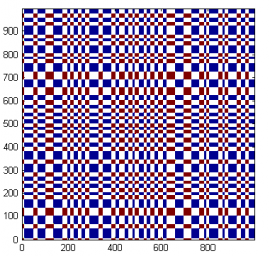- Fecha(s): 05/05/2016
- Lugar: Seminario del Departamento de Métodos Cuantitativos para la Economía y Empresa, UMU. Retransmisión en directo .
- Ponente: Mohammed Dore. Brock University.

We consider quarterly data of the Spanish economy from 1987 to 2013 to establish causal interconnections in a model free manner, using symbolic dynamics and permutation entropy (PE) and establish the exogeneity of adoption of the Euro (in Jan 1999) as the governing mechanism that leads to the key causal impacts on (1) interest rates,…
- Fecha(s): 27/11/2015
- Lugar: Seminario del Departamento de Métodos Cuantitativos para la Economía y Empresa, UMU. Retransmisión en directo.
- Ponente: Mª del Mar Sánchez de la Vega, Universidad de Murcia

Abstract This paper analyzes the rejection of tax fraud in Spain before and after the Great Depression and studies the role of certain determinants of two categories: internal or individual, and contextual, social or institutional. We use a logit model obtaining that the rejection of tax evasion depends positively on individual variables such as age…
- Fecha(s): 13/11/2015
- Lugar: Seminario del Departamento de Métodos Cuantitativos para la Economía y Empresa, UMU. Retransmisión en directo.
- Ponente: Mª Victoria Caballero Pintado, Universidad de Murcia

Abstract Análogamente a como los gráficos de recurrencia permiten visualizar la correlación integral de una serie temporal, definimos la herramienta gráfica para la correlación integral simbólica de una serie vectorial, son los gráficos de recurrencia simbólicos y gráficos de recurrencia simbólicos coloreados.Estos gráficos informan sobre la estructura de la serie como se ilustrara con distintos…
- Fecha(s): 30/10/2015
- Lugar: Seminario del Departamento de Métodos Cuantitativos para la Economía y Empresa, UMU. Se retransmitirá en directo.
- Ponente: María Isabel González-Martínez, Universidad de Murcia

Abstract Following the ideas of the Tourism Area Life Cycle (TALC) theory, we propose a dynamic econometric model for tourism demand where the reputation effect (the effect of the lagged demand on the current tourism demand) is not constant, but dependent on congestion. We test the model using panel data from Spanish regions during the…
- Fecha(s): 17/03/2015
- Lugar: Seminario del Departamento de Métodos Cuantitativos para la Economía y Empresa, UMU. Se retransmitirá en directo.
- Ponente: José Sánchez-Campillo, Universidad de Granada

Abstract Over ninety percent of the students taking the Spanish university admissions test (PAU) in recent years have passed on their first try. However, many public university degree programmes require high grades of their applicants. This requirement was reinforced in 2010 with the approval of the new PAU, which introduced a set of voluntary tests,…
- Fecha(s): 17/12/2014
- Lugar: Seminario del Departamento de Métodos Cuantitativos para la Economía y Empresa, UMU. Se retransmitirá en directo.
- Ponente: María Victoria Caballero, UMU

Abstract In this paper we introduce the symbolic correlation integral SC(m), which avoids the noisy parameter » of the classical correlation integral defined by Grassberger-Procaccia. Moreover we provide the asymptotic distribution of SC(m) under the null of i.i.d. With a MonteCarlo simulation we show the size and the power performance of the new test under…
- Fecha(s): 20/11/2014
- Lugar: Seminario del Dpto de Métodos Cuantitativos para la Economía y la Empresa, Facultad de Economía y Empresa, Murcia. Se procurará retransmitirlo en directo para doctorandos/as e investigadores/as remotos/as del Programa.
- Ponente: María Angeles Carnero, Universidad de Alicante

ABSTRACT: The identification of asymmetric conditional heteroscedasticity is often based on sample cross-correlations between past and squared observations. In this paper we analyse the effects of outliers on these cross-correlations and, consequently, on the identification of asymmetric volatilities. We show that, as expected, one isolated big outlier biases the sample cross-correlations towards zero and hence could hide true leverage…
- Fecha(s): 17/10/2014
- Lugar: Seminario Mtnez Gallur, Facultad de Economía y Empresa Campus de Espinardo, Murcia. RETRANSMISIÓN EN DIRECTO
- Ponente: Enrique Sentana, CEMFI

Abstract Nowadays copulas are extensively used in economic and finance applications, with the Gaussian copula being very popular despite ruling out non-linear dependence, particularly in the lower tail. We derive computationally simple and intuitive expressions for score tests of Gaussian copulas against Generalised Hyperbolic alternatives, which include the symmetric and asymmetric Student t, and Hermite polynomial expansions. We…
- Fecha(s): 04/06/2014
- Lugar: Sala de Seminarios del Dpto de Métodos Cuantitativos para la Economía y la Empresa (UMU) - Retransmisión en directo.
- Ponente: Cem Ertur, Université d’Orléans (coautor: Nicolas Debarsy, Université d'Orléans)

Cem Ertur, especialista de prestigio en econometría espacial (y coautor de varios profesores de la linea 9 del programa, especializados en esta rama de la econometría) hizo una visita a la UMU en junio. Gracias a la cooperación entre la UMU y la UNED, pudimos disfrutar de un seminario muy didáctico y conocer nuevos resultados…










